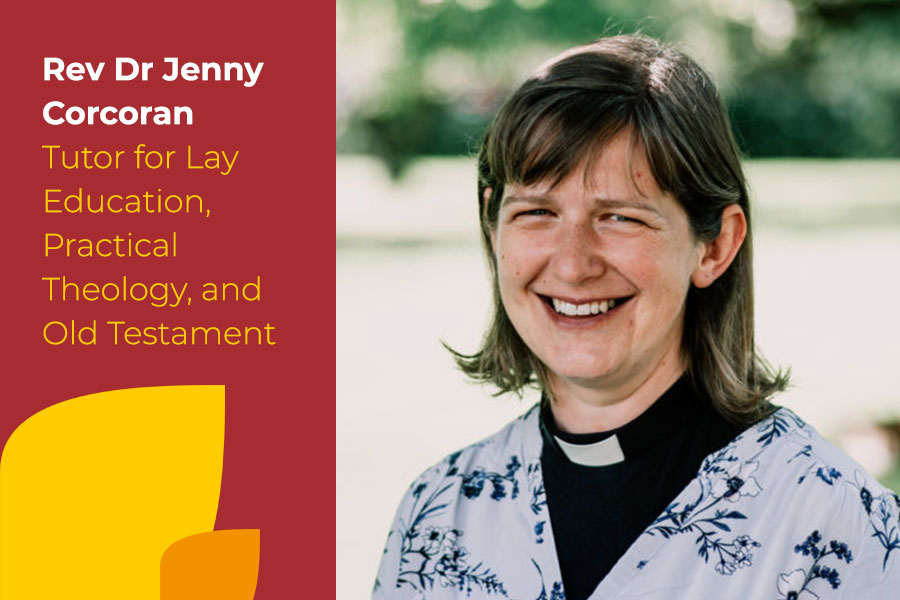
As a tutor in Biblical Studies and Practical Theology at St Augustine’s College of Theology, Jenny Corcoran isn’t interested in telling her students what to think. She wants to know who they are, how they respond to what they’re learning and, in pursuing their own unique formation, who they’re becoming.
Based on an interview with Rev Dr Jenny Corcoran
One thing I love about teaching at St Augustine’s is how we approach student formation.
There are no set ‘party lines’ in our classrooms. Students aren’t expected to learn and think a certain way. We’re not trying to produce a certain ‘type’ of minister or theology graduate.
For our students, studying theology becomes about who they are and how they’re going to grow – and only they can tell us who they’re going to become.
God will never ask you, ‘Why weren’t you Einstein?’
There’s a surprisingly poignant analogy for this guiding principle in an episode of the American sitcom Young Sheldon.
For those who haven’t seen the show, the titular character Sheldon is a startlingly intelligent and endearingly eccentric ten-year-old boy who dreams of becoming a world-renowned scientist. He lives in a Baptist Christian household but unlike his family, young Sheldon doesn’t believe in God.
In this episode, Sheldon discovers that his hero, Albert Einstein was Jewish. Sheldon theorises that if he’s going to become the best scientist in the world, he surely needs to become exactly like Einstein. For Sheldon, logic dictates that to achieve this goal, he needs to become Jewish.
So, Sheldon phones up his local synagogue, gets patched through to the Rabbi and asks about converting to Judaism so he can be just like Einstein. The kindly Rabbi, understanding Sheldon’s noble but misguided intentions, offers him some advice.
“Sheldon,” says the Rabbi, “I’m going to tell you to be your own man.” Sheldon doesn’t seem to understand, “But I want to be a great scientist like Albert Einstein!” he insists. The Rabbi smiles down the phone and says, “When your days are over, God will never ask you, ‘Why weren’t you Einstein?’.
“But He might ask you, ‘Why weren’t you Sheldon?’.”
Inviting every student into the conversation
Teaching theology is a gift and a joy, but it can also be a challenge.
Before St Augustine’s, I taught at a residential theology college. These colleges tend to have a more particular identity; for example, they may have an evangelical or Anglo-Catholic focus in their approach to study and worship.
Because of this identity, in residential theology colleges there’s a sense that broadly, a lot of students will anticipate certain approaches to texts or topics.
At St Augustine’s, we draw students from a wide variety of backgrounds. If I'm lecturing on the Old Testament, I can’t assume that everyone's going to have the same interpretation of the text.
As a matter of course, St Augustine’s students need to be able to explore more than one perspective or interpretation of a text, and be able to ask what it means.
The hope is that by doing this, every student is invited into the conversation.
The challenges and joys of teaching in diverse classrooms
We’re lucky enough to have a very diverse student community at St Augustine’s.
Not everyone is studying for the same reasons. I teach people who are training for ordained ministry and licenced lay ministry, and students who are studying theology because they just want to learn.
Within those three groups, we’ve got people from different wings of the Church who are studying at different ages and coming from different backgrounds.
I think that diversity is a really positive thing; not least because it challenges you as a teacher. There’s no easy option of saying, “We all basically think like this and there’s no other way of interpreting this text!”; it’s so much more interesting.
And it’s fun, too! One of my favourite things to do in class is to break students up into small groups and ask them to talk through a theological question. I love being able to wander around the room and listen in on the discussions; I get to hear what these students think and see how they discuss their ideas.
As a theology lecturer, one of the things that I have been known to say to my students is that in a lot of ways, your mark doesn't matter.
Rev Dr Jenny Corcoran,
Tutor for Lay Education, Practical Theology, and Old Testament at St Augustine's College of Theology
“Your final mark is just a number”
This focus on formation and personal discovery is the reason that I enjoy teaching in a theological college rather than say, a university.
If was teaching at a secular university, I’d be teaching a set curriculum to a group of 18 or 19-year-old. My days would be spent doing everything in my power to ensure that, by the end of the academic year, my students remembered enough technical theory to pass their assignments.
As a theology lecturer, one of the things that I have been known to say to my students is that in a lot of ways, your mark doesn't matter.
Don’t get me wrong, I hope my students pass, and it’s always nice to read something interesting when I'm marking essays, but the number at the top of the page is just that – a number.
What I really want to know is how that student’s been changed. What have they discovered about themselves? How has their relationship with God changed through their studies? That’s what’s really important.
“He realised that he didn’t need to be like anyone else”
After his call with the Rabbi, Sheldon has this moment of understanding that he could be all of who he was. He realised that he didn’t need to be like anyone else; he just needed to be Sheldon Cooper.
I like to think that we, as a theology college, are able to become a small part of that realisation for our students. Our aim is to provide students with a learning experience that will make a difference to them; something that will be part of their lives and ministry going forward.
That's what teaching theology is all about, after all; helping people discover more about God and more of themselves. Enabling them to ask who they are and who God is calling them to be – and to grow more confident in themselves.
That's what gets me out of bed in the morning.
Rev Dr Jenny Corcoran is a tutor for Lay Education, Practical Theology, and Old Testament at St Augustine’s College of Theology.
Discover theology study and connect joyfully with God and the world around you. Choose from a range of courses, discover flexible study options, and join a diverse and welcoming student community. Learn more about studying theology at St Augustine’s.

